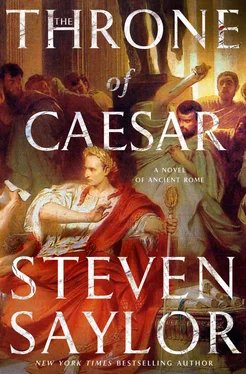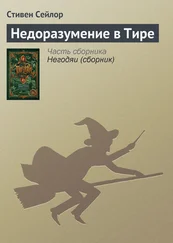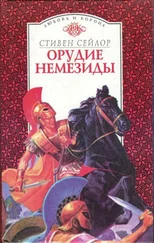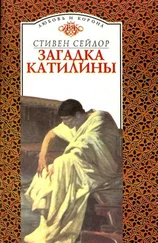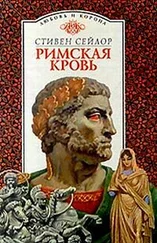Стивен Сейлор - The Throne of Caesar
Здесь есть возможность читать онлайн «Стивен Сейлор - The Throne of Caesar» весь текст электронной книги совершенно бесплатно (целиком полную версию без сокращений). В некоторых случаях можно слушать аудио, скачать через торрент в формате fb2 и присутствует краткое содержание. Год выпуска: 2018, Издательство: St. Martin's Press, Жанр: Исторический детектив, на английском языке. Описание произведения, (предисловие) а так же отзывы посетителей доступны на портале библиотеки ЛибКат.
- Название:The Throne of Caesar
- Автор:
- Издательство:St. Martin's Press
- Жанр:
- Год:2018
- ISBN:нет данных
- Рейтинг книги:5 / 5. Голосов: 1
-
Избранное:Добавить в избранное
- Отзывы:
-
Ваша оценка:
- 100
- 1
- 2
- 3
- 4
- 5
The Throne of Caesar: краткое содержание, описание и аннотация
Предлагаем к чтению аннотацию, описание, краткое содержание или предисловие (зависит от того, что написал сам автор книги «The Throne of Caesar»). Если вы не нашли необходимую информацию о книге — напишите в комментариях, мы постараемся отыскать её.
The Throne of Caesar — читать онлайн бесплатно полную книгу (весь текст) целиком
Ниже представлен текст книги, разбитый по страницам. Система сохранения места последней прочитанной страницы, позволяет с удобством читать онлайн бесплатно книгу «The Throne of Caesar», без необходимости каждый раз заново искать на чём Вы остановились. Поставьте закладку, и сможете в любой момент перейти на страницу, на которой закончили чтение.
Интервал:
Закладка:
“And to which category does Caesar’s paternity of Caesarion belong?”
“That matter,” he said carefully, “may be in flux.”
“How vexing it must be, having to deal with two realities. Navigating one is challenging enough for me. I didn’t think you much cared for the Egyptian queen. ”
“My feelings toward her have mellowed. As have hers toward me, I think.”
“The boy must be about four years old now. Speaking much?”
“Oh, yes. He inherited his mother’s gift for languages. She has him reciting nursery rhymes in both Greek and Latin. Probably in Egyptian as well.”
“And how does the little boy address Caesar? As ‘Dictator’?”
“Papa, you’re incorrigible. In private, he addresses Caesar as I address you.”
“But not in public.”
“I don’t think Caesar and Caesarion have ever been seen together in public, at least not in Rome. Perhaps, when we visit Egypt on the way to Parthia, to work out supply lines for the legions, that might change.”
“The queen has some public ceremony in mind? There’s a rumor that Caesar intends to marry her, make himself king of Egypt, and name Caesarion as his royal heir.”
“I can’t speak for the queen on that matter. Nor for Caesar.”
“But Caesar is residing at the garden estate along with Cleopatra?”
“Certainly not! That would set endless tongues wagging. Caesar visits the estate only during the day. He spends his nights with Calpurnia at the Regia.”
There’s plenty that can be done by daylight that could cause tongues to wag, I thought.
I looked at Meto and realized how glad I was for this unexpected little journey, which allowed me to spend some precious, rare time alone with him. Soon he would be leaving Rome again, off to war. What a worry he was to me, my warrior son! How many more chances would I have to see him? I had long feared for his life, but now I feared another mortality—my own. Whichever of us was to die first, the passing of time made it more and more likely that every moment spent together might be our last.
We descended the Palatine and passed though the Roman Forum, where a religious procession of some sort interrupted our progress. Then the bearers skillfully threaded their way through the bustling marketplace in the Forum Boarium. We crossed the nearby bridge and found ourselves at once in the countryside, or at least a well-tended version of it. We passed by the Grove of the Furies and then by the public meadows along the riverbank, where a handful of strollers were enjoying the lukewarm Martius sunshine.
A bit farther on, the road veered away from the river and then ran parallel to it, giving access to the sumptuous private estates that fronted the most desirable stretch of the Tiber. Here the wealthy of Rome had their second homes outside the city, where they could relax in lavish gardens, pursue fashionable hobbies like beekeeping, and in summer go boating and swimming in the river. From the road, almost nothing could be seen of these estates. They were hidden behind high walls that were themselves obscured by lush vines and other greenery.
We came to a gate in one of the walls. It opened to allow the litter to pass through. I never saw a guard, though there must have been several. Cleopatra, if not Caesar, would insist on stringent security. The queen had managed to eliminate most, but not all, of her close relatives. As long as any of them remained alive, there was always a chance they might make an attempt on her life, or that of Caesarion. That was the way of the Ptolemies.
I saw the house and its many terraces only in glimpses, through breaks in the greenery. We came to a stop, and Meto and I stepped from the litter into a garden with a view of the sun-spangled river. It was the same formally laid-out garden where I had visited Cleopatra before, with manicured shrubs, gravel paths, and carefully pruned rosebushes not yet in bloom. Tucked amid the shrubbery were exquisite pieces of Greek statuary. I recognized many, such as the young boy absorbed in pulling a thorn from his foot. But at least two of the sculptures were new to me—one of winged Cupid playing with a lioness, and another, quite large, of two centaurs making off with two captured nymphs. This piece was so stunning I had to stop and stare at it.
“Remarkable, isn’t it?”
I knew the voice but was still a bit startled to turn and face Caesar. He was dressed as if for some formal occasion, in the purple robes that he alone was allowed to wear.
“Dictator,” I said. I almost bowed my head, as one is expected to do for royalty, but stifled the reflex.
“Gordianus, welcome. And thank you, Meto, for bringing your father so promptly.”
“We were a bit slow getting across the Forum,” said Meto.
“No matter. I saw you gazing at the centaurs and nymphs. Truly, a remarkable piece. It creates a tremendous tension in the viewer, I think, whether he realizes it or not. One smiles, seeing the joyous lechery of the grinning centaurs—and then one quails, seeing the sheer terror on the sweet faces of the nymphs. I feel that tension, between the power of lust and the love of innocence, each time I look at it. By Arcesilaus, as I’m sure you can tell—you with your fine eye for details, Gordianus.”
“Yes, I noticed his stamp on one of the centaur’s hooves.”
“Ever since Arcesilaus did such an outstanding job sculpting the goddess for my new Temple of Venus, I’ve been collecting his work. I’ve just about filled the garden. Calpurnia complains that if I buy any more, we’ll have to purchase a whole new estate to make room for them. Ah well, I have no more time for such concerns. Though inevitably, in my coming travels, I’ll discover many works of art that I simply must bring back—so that I can share them with the people of Rome, of course.”
“Of course.”
A cloud obscured the sun. Caesar looked up, then at the Tiber, no longer lit with sparkles like hammered silver, but dull gray, the color of lead. “I’d thought we might talk here in the garden, but without sunshine it’s a bit chilly, don’t you think? Follow me. I’ll conduct you across Little Egypt and into the house. If the queen will permit us passage, that is.” He flashed a knowing smile at Meto.
Caesar led us though the garden. Each area was separated from the others by hedges, as rooms are separated by walls. There were yet more sculptural marvels, but Caesar’s brisk pace allowed me only passing glances. We arrived at length in a section of the garden with a shallow pond at the center, hedged all around by nodding stalks of papyrus. The pond was strewn with lily pads with bright purple flowers. Dominating the garden was a statue of Isis in one corner. The goddess was shown as the mother of Horus. She was seated, wearing a long dress that left bare her breasts, one of which she held in her hand, offering it to the suckling child on her lap. On her head was a nemes, the striped headdress worn by pharaohs, and surmounting that, reaching high in the air, was a crown of the Hathor type, a solar disk embraced by two upright cow horns and circled by a rearing cobra. The statue was of marble and brightly painted.
The image of Isis in the heart of Caesar’s estate was all the more striking because her worship in Rome, always controversial, had been banned by the Senate before the outbreak of the civil war, and her temple in the city had been demolished.
So completely was I absorbed by the statue of Isis that only when I heard the squeal of a child did I realize the garden was occupied. I turned to see Cleopatra seated on a wooden bench in the opposite corner, attended by a pair of handmaidens. She wore a gown of pleated linen. Her dark hair was pulled back into a bun. She wore a necklace and bracelets made of silver and adorned with jewels of smoky topaz and black chalcedony.
Читать дальшеИнтервал:
Закладка:
Похожие книги на «The Throne of Caesar»
Представляем Вашему вниманию похожие книги на «The Throne of Caesar» списком для выбора. Мы отобрали схожую по названию и смыслу литературу в надежде предоставить читателям больше вариантов отыскать новые, интересные, ещё непрочитанные произведения.
Обсуждение, отзывы о книге «The Throne of Caesar» и просто собственные мнения читателей. Оставьте ваши комментарии, напишите, что Вы думаете о произведении, его смысле или главных героях. Укажите что конкретно понравилось, а что нет, и почему Вы так считаете.
